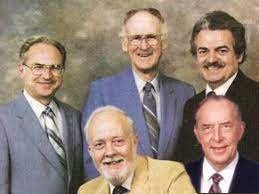My Facebook friend, Tov Rose, posted an old article by Dr. Michael Brown entitled: The Place of Tradition in Messianic Judaism, and wanted to hear our responses. I tried to share my thoughts, but it actually came out too long even for Facebook to handle. So, hear we go…
All right, I'll bite. As a note beforehand, I'll mention two things for people who don't know me—I'm not sure if they matter or not (or whether they should), but just to give a bit of background:
1. I am not a Messianic Jew from the standpoint that I am not ethnically Jewish. I call myself a Judeo-Christian, meaning I am a Christian person who is attempting to see his faith through the lens of the Bible's originally Jewish context. So rather than traditional Judaism or traditional Christianity, I am shooting toward understanding Biblical faith, which has its origins in the God and people of Israel from whom both Judaism and Christianity sprang.
2. Though we have interacted a few times online, I have never met Dr. Michael Brown personally. While we have similar views on many theological subjects, I have a sort of 'grappling relationship' with Dr. Brown regarding our respective teachings around the subject of Judaism's relationship to Christianity. Some might find our disagreements to be minor—especially from an outsider's perspective, but they are fundamental to the difference in our approach on these issues.
Having said these things, I highly respect Dr. Brown, and I would love to meet him and his wife, as we live on opposite sides of the same city. He has had a personally impactful relationship on my life, and I thank him for the ways God has used him to help me.
I actually believe that authentic, Biblical Christianity is a form of Judaism (Biblical Christianity is not Christianity in its present, traditional form).
I further believe that every true believer in Yeshua the Jewish Messiah is adopted into the people of Israel, whether they acknowledge this or not; whereas every Jew who renounces Messiah is currently estranged from Israel, denying the birthright that is theirs—no matter their ethnicity, level of observance, or the origin of their passport.
My approach to the Torah is very different from that of Talmudic Judaism, the Hebrew Roots Movement, and mainstream Christianity from the standpoint that I believe the Torah is the description of YHWH's character as it comes into contact with the human condition. It displays who YHWH is, and His government for ordering the world is released in it as it applies to us in the context of relationship. YHWH's purpose in commanding His people to obey the Torah is so the nations will know what it looks like to live under the government of the kingdom of God. In doing so, the Torah acts as a mirror, showing us how our nature has been bent toward self-worship, driving us to seek out YHWH for salvation.
Unlike the majority view of mainly Protestant Christians today, the Bible teaches us in Deuteronomy 30 that the commands of the written Torah are fully achievable. What must be changed is our NATURE—our bent toward self-worship. In the New Covenant, the Holy Spirit of YHWH indwells the worshiper, and moves us to obey the Torah by changing our nature back to its original state—a reflection of the wholly other-centered nature of YHWH Himself.
Talmudic Jews and many Messianic Jews do not believe the Torah ever applied to Gentiles anyway, and that only Jews have ever been responsible to 'carry the burden' of the Torah in the first place. However, this is contradicted by many passages, including Isaiah 56. This immediately shows a misunderstanding of the purpose and nature of the Torah. It is not meant to be a burden we must carry, but an outpouring of the breath of life we receive from YHWH.
I do believe that the establishment of the New Covenant has adapted the Sinai Covenant to the work of Yeshua the Messiah with regard to sacrifice, penalty, and priesthood (whereas Dr. Brown believes, along with most Christians, that the New Covenant has abolished the Sinai Covenant—he has stated this in many Line of Fire broadcasts). I believe Hebrews 8 & 9 show the abolishment of the Aaronic Priesthood in fulfillment of 1 Samuel 2:27-36, not the Sinai Covenant as a whole (I teach about this more on my website). In the New Covenant, as the Holy Spirit transforms our nature through this relationship, we will obey the Torah by default, as our behavior will line up with the nature we reflect.
Stereotypically speaking in contrast, most groups believe that the Torah consists of 613 laws creating a debt that one must pay in order to be found acceptable to YHWH. Christians generally believe that debt was paid by Yeshua on the cross, while Hebrew Roots adherents and Talmudic Jews obviously do not. Messianic Jews tend to fall within the Christian camp, but keep many of the traditions of Talmudic Judaism primarily for the purpose of ethnic continuity or missionary appeal.
The 613 laws of Talmudic Judaism are actually the traditions it has created AROUND the commandments of the Scripture rather than the actual commandments themselves—which Dr. Brown very indirectly alludes to here; this brings us to our current conversation around the article.
I think that most people tend to look at Judaism as a monolith (some see Christianity this way as well, but to a lesser degree). They think that today's Talmudic Judaism is the Judaism of the Bible, and this is by design. Just as Roman Catholicism and Eastern Orthodox Christianity each claim that they are the one true, authentic Christian faith that can trace its roots all the way back to the Apostles through lines of succession, Talmudic Judaism would like us to believe that their traditions are authentically connected at the least to Moses, with some going all the way back to Abraham. This is, in a sense, true—in that they are derivatives; but that any of these traditions remain unbroken and unchanged is patently false.
Even the Jewish Encyclopedia states that Talmudic Judaism is a direct descendant of the Pharisees, and that all Talmudic traditions and teachings have their origin in this group. A cursory study of history reveals that the the Pharisees were merely one of several 'Judaisms' of the day (there were at least two major, very different theological opposition groups: the Sadducees and the Essenes); and in turn, when looking at the entire scope of history for the nation of Israel, 'the Jews' only made up two out of the twelve tribes of Israel. Since the kingdom split, and since the northern ten tribes were virtually wiped out by the Assyrians, we have limited knowledge of Israel's practices as a whole before the Babylonian exile of the kingdom of Judah.
When analyzing the behavior patterns of Jesus, the Apostles, and the Early Church Fathers, we see that Jesus actually took elements of each of the major branches of Judaism in His day: while He was closest in theology to the Pharisees, He stuck with the written Word as the Sadducees taught; yet He adopted much of the simpler lifestyle and teaching from the Essene community. John the Baptist was even closer to Essene theology, and early Christianity drew much from this branch.
However, with the destruction of the Temple, all Jewish groups disappeared except the Pharisees and the new Messianic believers. I have a timeline here on my website outlining the increased emnity and eventual split between the two groups.
The Major Factors of the Split between Judaism and Christianity
After this split, which culminated in 364 A.D. with the Christian Council of Laodicea, what was fast evolving toward Talmudic Judaism became the only authority on 'being Jewish', while Western Christianity disavowed anything Jewish and even set itself as anti-Jewish. And it is here that I begin to split hairs with Dr. Brown. He says, "There is a qualitative spiritual difference between the Messianic faith and the Rabbinic faith." This is granted, and we can see it; but on the flip side, we must ask, "What is 'Messianic Faith' as opposed to an openly-declared anti-Jewish or an even anti-Semitic Christianity?"
I fully agree with Dr. Brown that a focus on rabbinic tradition is unhealthy. But this is equally true of Christian tradition. This is why I use the moniker 'Biblical Faith' on my website, because the Bible—the written Word of YHWH, in its original context and language, interpreted by the life and work of Messiah Yeshua—the Word of YHWH made Flesh, is the only plumbline by which we can measure any of this stuff. But we have to understand the context in order to get the true meaning of the Biblical text—an accurate understanding of the language alone does not do it for us. And while archaeology has provided us with a lot of information, the problem is that Christianity has destroyed the original Jewish context for its teaching so thoroughly that one can only glean tiny bits of it by going through great effort to sift it out of the dust, clean it off, and try to painstakingly fit it back together. It just doesn't work very well at all. So Talmudic Judaism is the only living thread that ties us back to any form of the original Biblical context—even if it's flawed. So I disagree with Dr. Brown when he says rabbinic traditions have "...NO place in our private lives or public services." Little place? Agreed. No place? A bit harsh.
Furthermore, I disagree with his statement that Talmudic Judaism "...is utterly devoid of New Covenantal truth [viz. the Siddur]...[it]...is a religion alien to the New Covenant faith." This may be true in the understanding of what Talmudic Judaism has become; however, as I have already said, it springs from the people of the Sinai Covenant, however it has moved far afield. So there are things there; and whatever is true, I embrace or at least glean from, just as is the case with other forms of Christianity. People are surprised to find that I accept the books of the Roman Catholic, Eastern Orthodox, and Ethiopian Orthodox branches of Christianity which are outside of the protocanon (the ‘Protestant 66’) as deuterocanonical works with theological value. Furthermore, I believe the Eastern Orthodox Christian view on the sin nature is more correct than the Protestant/Catholic/Talmudic Jewish view, the latter of which leads people to an incorrect understanding of the Torah and subsequently of the Gospel.
As I have said, the Bible in its original language and context, interpreted by the life and work of Yeshua, is the Word of YHWH, and this Word is the final rule of faith and practice. The Spirit testifies to it and makes it manifest in our hearts. Anything that disagrees with this must be discarded. Talmudic Judaism is often obvious in its contradictions to Biblical Faith, just as Roman Catholicism, Orthodoxy, and various Protestant traditions.
We have to trim off anything we may have learned that negates the Word. And to Dr. Brown's point, I believe we should be honest with everyone about this. I'm not trying to be a Talmudic Jew. I'm not claiming to be Catholic or Eastern Orthodox. I'm shooting for what the Bible says. I have a real, live relationship with Yeshua the Messiah, and I am attempting to practice Biblical faith out of the context of that relationship. Yet I can glean from any of these traditions that are helpful and have ties into what YHWH is saying to me—and some of them very much are!
Let's take an example of some of the things Dr. Brown mentioned:
Should we wear a tallit (or tzitzit) in our services? Well, we certainly can see that YHWH asked His people to wear techelet-colored fringes on the four corners of our garments for the purpose of remembering the commandments. However, in the New Covenant, it is clear that the Holy Spirit Himself is the One who moves us to obey the commandments; so I would argue that the fringes are no longer needed. Furthermore, as Dr. Brown said, the rabbis have declared that since the original formula for techelet has been lost, we should do white. What? You want to use a completely different color, rather than a possibly, slightly different shade of the same color because somehow that's better? This sounds like a King Saul solution to me. And nothing has been said in the Word about knots, nor is there anything in the Word about the tallit or tzitzit aiding us or assisting us in prayer. However, if one wants to wear these for traditional purposes, there's nothing saying they can't. What we need to do is guard against the tendency to believe that the one who wears these is more spiritual than the one that doesn't.
Should we light the Shabbat candles and pray the traditional prayer? Dr. Brown addresses that this is traditional rather than commanded. But the candles are for remembrance and observation, which YHWH did command us to keep. Did YHWH abrogate the seventh-day Sabbath? I would say all who are reading this with interest would say no (Dr. Brown says yes), and I'm already way too long in my response to argue the point; however, I would ask why is it wrong to perform a tradition in line with an activity so vital to the Father's heart that His condemnation for its abrogation ranks among murder and idolatry? Concerning his comment about honoring the Torah, my response would be that it's not the flame that matters. YHWH didn't say, "Don't kindle a fire on Shabbat" because He dislikes flames. It's about the fire being the economic, self-sustaining engine of the home. My question would be to redirect this question to the Talmudic Jew who refuses to flip a light switch or drive a car, when walking to synagogue is clearly far more work.
Last bit: Dr. Brown said "...find any evidence at all that these first Messianic Jews (generally called Nazaraeans) were ever accused by the Church Fathers of keeping any rabbinic traditions. This point is important! Sooner or later we will have to realize that being Jewish does not mean being rabbinic." I agree with the last point, and disagree with the first. The Didache, of which I produced the first modern English translation in 2017, shows a continuity of Jewish practice in the early Christian Church; and for this reason, I believe, it was ultimately rejected from the canon. My book, The Judeo-Christian, as well as the article on my website entitled Paul Misinterpreted? argues that Jewish practices were continuing in the Church. OF COURSE they were not Talmudic, because Talmudic Judaism didn't arrive until later. But they came from a similar strand, a common thread attached to Biblical faith that has been lost from both Talmudic Judaism and all branches of Christianity; and where we can see Biblical faith, we should grab it rather than let it go—and where we see empty tradition, we should let it fall away.

































![“from 1542 to 1546, which was the softer period of his [John Calvin's] government, we count 58 capital executions, 76 banishments and 900 imprisonments.” —Jean Tet, Histoire de la persecutions religieuse à Genève (Paris: Lecoffre, 1879), p. 473](https://images.squarespace-cdn.com/content/v1/52c07648e4b0fef45e65085b/1511092542761-WC11G9CAM810YRZ9BPKI/Calvinist+crimes.jpg)


